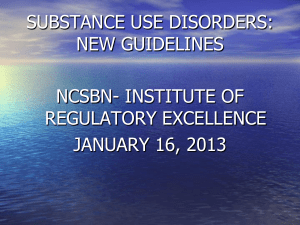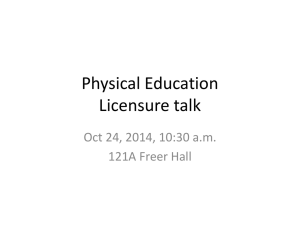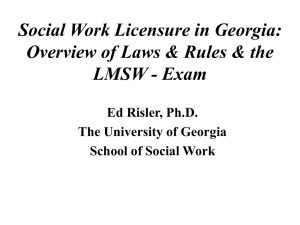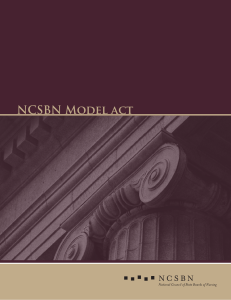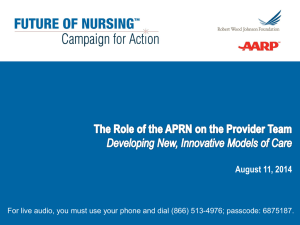Model Act and Rules Committee - National Council of State Boards
advertisement
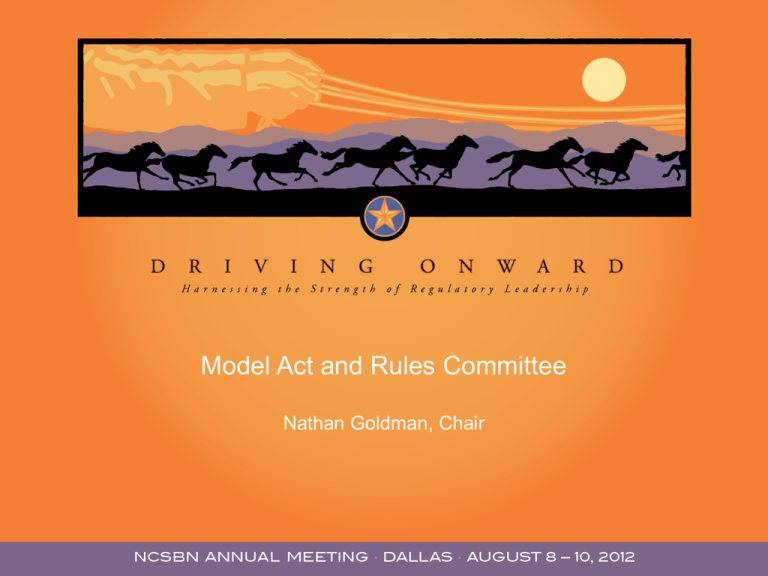
Model Act and Rules Committee Nathan Goldman, Chair WHAT IS A MODEL ACT? • According to the Michigan Law Revision Commission and the Harvard Law School, Model Acts are carefully drafted laws for potential enactment by state legislatures in whole or in part. Model Acts are experimental efforts to assist states in developing effective new approaches to a particular area of the law. Purpose of NCSBN’s Model Act and Rules • Overall, the Model Act and Rules are intended to serve as a guide for Member Boards. • However, NCSBN encourages all boards to adopt as much of the Model Act and Rules as possible. NCSBN MODEL NURSING PRACTICE ACT • • • • First adopted in 1982. Revised in 1988, 1993, 1994, 1997, and 2004. CBCs added in 2006. APRN Consensus Model language added in 2008. Model Act and Rules Committee • Appointed in FY 2011 • Charge: Review and revise the NCSBN Model Act & Rules as needed Rose Kearney-Nunnelly, Chair (FY 2011) Nathan Goldman, Chair (FY 2012) Committee Members • • • • • • • • • Betsy Houchen, RN, JD, Ohio, Board Liaison Kathleen Beebout, RN, JD, Iowa Dusty Johnston, JD, Texas Fred Knight, JD, Arkansas Sandra Priebe, RN, Arkansas Pamela Randolph, RN, Arizona Laura Rhodes, RN, West Virginia Caron Robertson, RN, Massachusetts Peg Sheaffer, RN, JD, Pennsylvania Committee’s Goals for Revisions • • • • • • • Streamline Reduce redundancy Clarify Organize Update/conform with other NCSBN initiatives Move detail from Act to Rule Use legislative language Overview of Major Changes • Reformatted the Act and Rule into two separate documents • Reordered and renumbered Articles and Chapters • Revised language in all Articles and Chapters, except Nurse Licensure Compact and APRN Compact • Removed all explanatory notes • Replaced the term “client” with “patient” New Organization • • • • • • • • • • • • • Title and Purpose Definitions Scope of RN and LPN/VN Practice Board of Nursing RN and LPN/VN Licensure and Exemptions Prelicensure Nursing Education Discipline and Proceedings Violations and Penalties Implementation Unlicensed Assistive Personnel APRN Nursing Licensure Compact APRN Compact Highlighted Changes Title • This Act shall be known and may be cited as <the JURISDICTION> Nurse Practice Act (NPA), which creates and empowers the board of nursing (BON) to regulate nursing and to enforce the provisions of this Act. Purpose • The purpose of this Act is to protect the health, safety and welfare of the residents* of this state. • *The term “residents” was used instead of “citizens” based upon comments received at MYM Definitions • Deleted definitions that are commonly understood • Deleted definitions that are defined beyond nursing law (ex. legal definitions) • Deleted definitions for words not used in the text of the Act or Rules • Removed NLC definitions for inclusion in that Article/Chapter Revised/Maintained Act Definitions • • • • • Advanced assessment Clinical learning experiences Competence Comprehensive nursing assessment Delegating • Eligible for graduation* • • • • Encumbered Focused nursing assessment Inactive license Internationally educated applicants Act Definitions, cont. • • • • • • • • License Nursing Patient Patient-centered health care plan Reactivation Reinstatement Supervision Unlicensed assistive personnel Revised/Maintained Rule Definitions • • • • • • • • • Dual relationship NCLEX-PN® NCLEX-RN® Nursing faculty Preceptor Professional boundaries Professional-boundary crossing Professional-boundary violation Sexualized body part Board of Nursing • Deleted requirement that BON members must be eligible to vote • Added authority to: – Share current significant investigative information with other regulatory bodies and law enforcement entities – Withdraw a license issued in error – Conduct criminal background checks for nurse licensure in accordance with state and federal law – Issue a cease and desist order for any violation of the Act and – Adopt criteria for recognizing national certifying bodies for APRN roles and population foci Executive Officer • Deleted specific requirements related to EOs: – RN license – Masters degree or higher – Certain years experience • Kept language that requires EO to be “qualified” • Added power to hire and fire RN and LPN/VN Licensure and Exemptions • Revised Model Act and Rules to conform with the approved Uniform Licensure Requirements (ULRs) that were passed at Delegate Assembly in 2011. • Removed all reference to a modified license per ULRs. Licensure by Examination • Revised graduation language: Graduate from or be eligible for graduation from a <your jurisdiction> BON-approved prelicensure program or a program that meets criteria comparable to those established by the <your jurisdiction> BON in its rules Licensure by Examination • Added the following requirements per the ULRs: – Report any substance use disorder in the last five years – Report any action taken or initiated against a professional or occupational license, registration or certification – Graduates from an RN prelicensure program who take the LPN/VN exam must complete a role delineation course. Internationally Educated Applicants • Graduation from a nursing program comparable to a BON approved prelicensure RN or LPN/VN program, whichever is applicable • Applicant must submit to a credentials evaluation by a BON approved/authorized organization for the level of licensure being sought • Successful passage of an English proficiency exam that includes the components of reading, speaking, writing and listening, except for applicants from countries where English is the native language, and the nursing program where the applicant attended was taught in English, used English textbooks and clinical experiences were conducted in English, and • Disclosure of nursing licensure status in country of origin, if applicable Licensure by Endorsement • Graduate from a <your jurisdiction> BONapproved prelicensure program or a program that meets criteria comparable to those established by the <your jurisdiction> BON in its rules • Report current participation in an alternative to discipline program in any jurisdiction • Submit verification of licensure status directly from the U.S. jurisdiction of licensure by examination Renewal and Reactivation • Applicant must report: – Criminal conviction, nolo contendere plea, Alford plea, deferred judgment, or other plea arrangements in lieu of conviction – Status of all nursing licenses, including any BON actions taken or any current or pending investigations – Substance use disorder in the last five years – Actions taken or initiated against a professional or occupational license, registration or certification and – Current participation in an alternative to discipline program Continued Competence • Deleted specific practice hour requirements and inserted the following note as a placeholder: ***At the present time, evidence does not support any one mechanism for continued competence and further study is warranted. Criminal Background Checks • Act: Each applicant for licensure shall submit a full set of fingerprints to the BON for the purpose of obtaining a state and federal criminal records check pursuant to <state statute> and Public Law 92-544. The <state agency responsible for managing fingerprint data> may exchange this fingerprint data with the Federal Bureau of Investigation (FBI). Criminal Background Checks • Rule: All individuals convicted of a sexual offense involving a minor or performing a sexual act against the will of another person shall be subject to a BON order for evaluation by a qualified expert approved by the BON. If the evaluation identifies sexual behaviors of a predatory nature the BON shall deny licensure. • Other criminal convictions may be reviewed by the BON on a case by case basis to determine eligibility for licensure Discipline and Proceedings • Expanded authority of the BON • Modified grounds for discipline • Added additional immunity/protection from retaliation • Revised portions of the Alternative to Discipline Program requirements and criteria Expanded Authority of BON • Summarily issue emergency limitation or restriction of a license • Summarily issue an emergency suspension of a license • Reprimand or censure a license • Accept a voluntary surrender of a license • Accept other voluntary limitation or restriction of a license • Place other limitations or restrictions on a license Grounds for Discipline • Added: – Non-Compliance with federal, jurisdictional or contractual requirements – Confidentiality, patient privacy, consent or disclosure violations – Misconduct or abuse – Other violations of the Act or administrative rules • Deleted requirement that the criminal conviction or adjudication relate to the practice of nursing or to the ability to practice nursing. Immunity/Retaliation • A person may not suspend, terminate, or otherwise discipline, discriminate against, or retaliate against anyone who reports, or advises on reporting, in good faith under this section. • Cause of action for good faith reporter against retaliator Alternative to Discipline Monitoring Programs • Added detail to the functions and responsibilities of programs • Modified the eligibility criteria to add specificity • Added screening and assessment requirements • Expanded contracts section • Added notification, monitoring and practice requirements and limitations as well as standards for returning to work Unlicensed Assistive Personnel • Deleted all reference to the CNA II role • Added specificity to the roles, duties and requirements of CNAs and MACs • Expanded basic curriculum and training requirements • Added section to the Rules for CNA and MAC discipline • Limited what MACs can do to medication administration and related tasks only • Removed all references to long-term care facilities APRNs • Additional Practice language added: – Delegating and assigning therapeutic measures to assistive personnel – Consulting with other disciplines and providing referrals to health care agencies, health care providers and community resources – Wearing identification which clearly identifies the nurse as an APRN when providing direct patient care, unless wearing identification creates a safety or health risk for either the nurse or the patient and – Other acts that require education and training consistent with professional standards and commensurate with the APRN’s education, certification, demonstrated competencies and experience APRN Prescribing • Added the following terms to what an APRN is authorized to prescribe, furnish, order, administer and dispense: – durable medical equipment – blood and blood products APRN Licensure • Deleted the contact hours limitation related to herbal and complementary therapies from the endorsement and renewal rules Questions?
